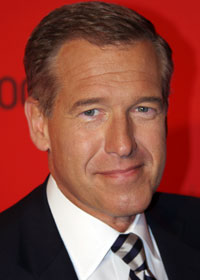 An Internet meme shows a close-up of Brian Williams, the NBC “Nightly News” anchor recently suspended for six months without pay for lying to his audience.
An Internet meme shows a close-up of Brian Williams, the NBC “Nightly News” anchor recently suspended for six months without pay for lying to his audience.
The caption reads, “So there we were at this bridge, and Frodo says to me, ‘Here, you take the ring.’ ”
It’s funny, but the humor suggests there’s little shock associated with a disaster for my profession. A big-time journalist gets caught lying. Yawn.
As you know, Williams had said (for years) that he was aboard a helicopter that was attacked and downed during the Iraq war, but that wasn’t true. He was on another aircraft.
Additionally, CBS News reported last week that Williams also told an audience in 2008 the “wow” moment of his career was being at the demolition of the Berlin Wall in 1989, but there are now reports that he actually arrived the day after the wall came down.
These inaccuracies (which beg the question of how many more haven’t come to light) are tragic for the damage they do to journalism. They’re tragic for Williams too; he doesn’t need the street cred. Regardless, his punishment doesn’t fit his “crime.”
Presuming a fair and thorough investigation proved beyond reasonable doubt what Williams did, he should be fired immediately, and not in Washington or Wall Street fashion – “Brian is stepping down to spend more time with his family.”
The press release should read: “Mr. Williams’ employment with NBC News has been terminated, effective immediately. NBC News will not knowingly tolerate intentional fabrication under any circumstances at any time.”
Nobody thinks Williams lacks talent. As the Washington Post notes, “On camera, Williams was preternaturally gifted, cutting a handsome figure with a serious but easygoing manner.”
And everybody makes mistakes, but I can’t accept getting confused about an aircraft you’re aboard being attacked, or about witnessing one of the biggest moments in modern history.
I teach basic news writing here at Northern Illinois University. My policy on academic honesty meshes with NIU’s Student Code of Conduct, but I make it simple. “If I catch you cheating or fabricating,” I tell students, “I’ll automatically seek the harshest penalty I can get.”
Then I foretell ugly truths. I have students monitor pop culture (movies, TV shows, books, music) for instances of journalists being portrayed. At the end of the term, they’re startled to realize journalists are routinely depicted as narcissistic, amoral scabs.
It’s unfair, but journalism can handle that. Somebody has to enable the perps on “Law & Order SVU.”
We can also handle celebrities and politicians (Sarah Palin comes to mind) warning people not to believe the “lamestream” media. The funny part here is that many of these same folks crave media attention above all else.
And because we must, we will endure the Williams scandal, like we did the Jayson Blair/New York Times scandal a dozen years ago. That was another case of a talented journalist making up stuff.
But the cumulative effect of pop culture, politicians, and genuinely terrible, self-inflicted scandals create an unacceptable level of toxicity, and that’s why Williams has to go.
 That probably sounds unfeeling, but I know what it’s like to be a journalist scandalized in the news.
That probably sounds unfeeling, but I know what it’s like to be a journalist scandalized in the news.
I was editor of my college newspaper during a controversial university administration. Later I covered education as a professional reporter, and my beat included my alma mater. During that time, some people started an underground newspaper highly critical of the administration. I knew a couple of them but had no role in putting out the paper. They had rented a post office box for letters to the editor, and the person who had the key moved. She gave me the key, and I returned it to the others.
That’s basically it, but my “involvement” became front-page news. My paper interviewed me, as did The Associated Press. My alumni association bought ads blasting me in several newspapers. People asked my parents “what happened” with me. There was discussion of firing me. In the end, I kept my job and my beat, but was disallowed from covering my university – that, too, was a front-page story.
Journalists get paid to tell compelling stories. However, Stephen King writes fiction, we’re supposed to write non-fiction, and the line that separates them has fuzzy edges, but it is a line. Most of us understand this, but few of us have audiences numbering in the millions.
Jason Akst is an instructor in the NIU Department of Communication. He teaches journalism and public relations, and also serves as a board member for the Northern Illinois Newspaper Association.


